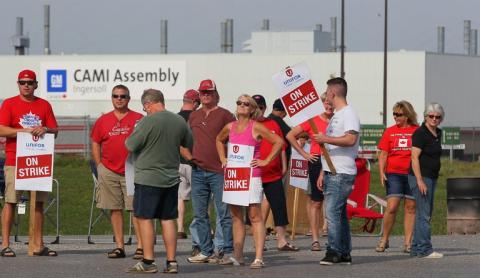OTTAWA — Workers at a General Motors assembly plant in Ontario went on strike late Sunday as union leaders reported an impasse in talks to keep Canadian jobs from moving to Mexico.
It is the first strike at a Canadian auto assembly plant in 21 years. The roughly 2,750 unionized employees at the factory, in Ingersoll, Ontario, may have been emboldened because it builds the Chevrolet Equinox, a small sport-utility vehicle that is a sales success for G.M.
A union statement said negotiations had fallen apart over demands that Ingersoll be designated the primary assembly site for the Equinox. In July, production of the GMC Terrain, a similar vehicle, was moved to Mexico from Ingersoll, leading to the loss of 600 jobs at the Canadian factory. The Equinox is also made in Mexico.
“These workers are standing up for good jobs. Not just for themselves, but for the entire community,” said Jerry Dias, president of Unifor, the union representing the workers.
In a brief statement, General Motors of Canada said it had made “very positive progress on several issues over the past weeks” with the union and asked Unifor to return to negotiations.
The Equinox is in an increasingly popular market segment where it competes against two vehicles also built in Ontario: the Toyota RAV4 and the Honda CRV. According to Automotive News, the Equinox’s year-over-year sales through August were up 17 percent in the United States and 40 percent in Canada. American G.M. dealers have enough Equinoxes in stock to cover 53 days of sales compared with an average of 82 days for all other Chevrolet models, according to the trade publication.
The company spent 800 million Canadian dollars (about $660 million) on new facilities and tooling at Ingersoll for the current version of the Equinox.
The factory is owned by General Motors, but it was originally used in a joint venture with Suzuki. That means its workers are not covered by the union agreement that Unifor reached with G.M. last year for its other Canadian plants.
As a priority in the G.M. negotiations, as in talks with automakers last year, Unifor has sought a commitment to continue and expand production in Canada.
In July, Unifor, Canada’s largest private-sector union, held what it called a town-hall meeting in Ingersoll demanding that the current renegotiation of the North American Free Trade Agreement lead to greater job protection for Canadian factory workers. Industrial production in Canada, and Ontario in particular, has shifted toward both the United States and Mexico under Nafta, in addition to the general global shifts toward other countries, particularly China.
Mr. Dias, echoing President Trump to some extent, blames Mexican wages and employment standards for the lost jobs in Canada.
“Look, Canada and the U.S. agree that the problem isn’t us — especially in the auto sector,” Mr. Dias said last month in an interview with The Windsor Star, the newspaper in an auto town that has lost all its G.M. plants. “The problem is Mexico.”
He added: “The whole argument that opening up markets is somehow going to benefit working-class people — Nafta has shown that isn’t true.”


Spread the word